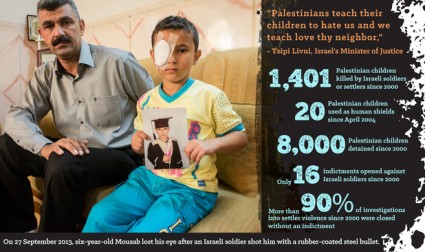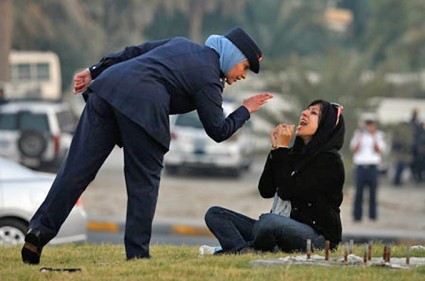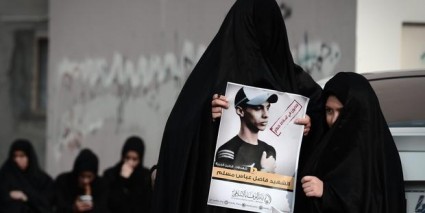How many Children must Israel Murder before the World Says Enough?
February 4, 2014 No Comments
Saudi law made to fend off threats of Democracy, human rights accountability
Saudi law warns US not to interfere in domestic affairs, democracy or human rights – advocate
4 February, 2014 – Voice of Russia
Saudi Arabia has signaled to the United States ahead of US President Barack Obama’s upcoming visit to the country that human rights will be subordinated to the pursuit of terrorists. Unde the new law anyone who “insults the reputation of the state or its position” is now considered a terrorist, punishable by to up to 20 years in jail. Dr. Ali Alyami, the Executive Director of the Center for Democracy and Human Rights in Saudi Arabia, discusses the motives of this legislation with the Voice of Russia.
Could you please explain to us this new piece of legislation? It was approved by the Cabinet back in December. But was there a time to talk about it, to discuss it or maybe to overrule it?
There are a couple of laws that were rectified by the King in the last two or three days. The one that was issued in December of last year was severely criticized by domestic people and also by the entire national media. And then on the eve of the president’s of the US visit to Saudi Arabia the King decided to rectify this and make it to the Saudi law.
The idea behind all of these laws are pretty defective actually. The fact that the government stated that it is objective is to deter and punish terrorist or terrorist-to-be when in fact they don’t need any homage because Saudi Arabia’s system is absolute system and there are no codified laws, it is a religious based judicial system and the judges could do whatever they want to do. …more
February 4, 2014 No Comments
Scrambled Brains: Prince Bandar suffers from Uncooperative Fascist Syndrome
Rumours of reshuffling in Saudi Arabia
Voltaire Network – 4 February, 2014
King Abdallah of Saudi Arabia is supposedly on the verge of overhauling his foreign policy and preparing his succession, according to rumors circulating in London and Geneva.
With this in view, his intelligence chief Prince Bandar Ben Sultan has allegedly been accused of suffering from cognitive problems following an attack of which he was the victim in July 2012, whereas Prince Saoud al-Faiçal, the Foreign Minister for 38 years, is said to be affected by senility.
For a week, various sources have reported Prince Bandar’s hospitalization in the United States to undergo surgery. During this time, a special emissary was purportedly sent by Washington to Riyadh for talks with the King and his son. …source
February 4, 2014 No Comments
Obama to Meet with Saudi’s to shore up plans for Regional War
Obama to visit Saudi Arabia in March
By David Nakamura – 3 February, 2014 – Washington Post
President Obama will make his second trip to Saudi Arabia in March, the White House announced Monday, in a bid to reassure a key U.S. ally about the administration’s policies in the Middle East.
Obama will meet with King Abdullah during the trip, which was tacked on to the end of a three-country tour of Netherlands, Belgium and Italy, where Obama will meet Pope Francis. The Wall Street Journal first reported the trip last week, citing Arab officials who said the relations between the two governments was “deteriorating.”
The president’s trip comes after Secretary of State John F. Kerry visited Saudi officials in January. …more
February 4, 2014 No Comments
Bahrain follows Saudi Arabia by legalizing Human Rights Violations
HM the King issues four laws
4 February, 2014 – BNA
(BNA) – His Majesty King Hamad bin Isa Al Khalifa today issued four laws for this year.
According to Law 1, Article 214 of Penal Code of 1976 was amended as follows:
“A prison sentence of a minimum of one year and a maximum of two years, and a fine of not less than BD 1000 and not more than BD 10000 shall be the penalty for any person who offends publically the Monarch of the Kingdom of Bahrain, the national flag or emblem, and the penalty shall be tightened if the offence was committed in the presence of the King.”
In Law 2/2013, HM the King ratified the by-law of the GCC Emergency Management Centre.
…source
February 4, 2014 No Comments
New Saudi law legalizes a range Human Rights Violations
Amnesty International censures KSA over controversial law
4 February, 2014 – Shia Post
Amnesty International has censured Saudi Arabia over a controversial counter-terrorism law, calling it the kingdom’s new tool to crush peaceful expression.
The UK-based rights body says the new Saudi law legalizes a range of ongoing human rights violations.
In a Monday statement, Amnesty’s Deputy Director for Middle East and North Africa Said Boumedouha said, “This disturbing new law confirms our worst fears – that the Saudi Arabian authorities are seeking legal cover to entrench their ability to crack down on peaceful dissent and silence human rights defenders.”
This came after Saudi Arabia put into effect the controversial counter-terrorism law that allows Riyadh to prosecute as a terrorist anyone who demands reform, exposes corruption or protests against the kingdom’s policies.
“Passing a law with so many serious flaws two years after identical issues with the earlier draft were pointed out does not bode well for the authorities’ plans to end long-standing violations in the name of counter-terrorism. The changes made to the law since 2011 have done little to diminish the potentially devastating impact on human rights. The legislation just seems to codify the Ministry of Interior’s repressive tactics, which Amnesty International has documented for years,” the statement added.
The law, passed by the council of ministers and ratified by King Abdullah in December last year, went into effect on Saturday.
The legislation, made up of 40 clauses, states that any action that “undermines” the state or society, including calls for change of government in Riyadh, can be tried as a terrorist act. The law also gives security forces and intelligence agencies sweeping powers to raid homes and track phone calls and Internet activity.
A large number of activists, clerics, judges and journalists have been jailed in Saudi Arabia for voicing their opposition to the kingdom’s policies.
Over the past 10 years, Saudi Arabia has also arrested thousands of people and accused them of being involved with al-Qaeda. …more
February 4, 2014 No Comments
American Disphoria – Obama remakes Al Qaeda as the ‘Good Guys’
“True to its origins as a Western intelligence asset, al-Qaeda is helping to create an illusion in Syria that will enable US weapons supply to the militants to continue,”
Re-inventing al-Qaeda as ‘good guys,’ huh?
4 February, 2014 – By Finian Cunningham – PressTV
The titular head of al-Qaeda, Ayman al-Zawahiri, has reportedly disavowed the Islamic State of Iraq and Syria (ISIS). Videos emerged over the weekend of the Egyptian-born leader denying any organizational links with the ISIS.
The British Guardian reported that the move by the top al-Qaeda commander was an attempt to “reassert control” over the disparate militant groups fighting in Syria.
Later in the same report, the newspaper inadvertently hinted at the real motive for the initiative. “The internecine fighting – among the bloodiest in the three-year conflict – has undermined the uprising against President Bashar al-Assad and dismayed western powers pushing for peace talks,” reported the Guardian.
Forget the bit about “dismayed western powers pushing for peace talks.” That’s hogwash. The key phrase is “internecine fighting has undermined the uprising [sic] against President Bashar al-Assad.”
By “uprising,” the Guardian is euphemistically referring to the covert criminal war sponsored by the West against the Syrian government and its people. This is not an uprising or civil war; it is Western state-sponsored terrorism for regime change using foreign mercenaries of varying affiliation to al-Qaeda – the latter itself being historically a Western, Saudi intelligence creation from the late 1970s onwards.
The political problem for the West is that it cannot be seen to be overtly supporting the al-Qaeda brigades. That would very publicly destroy the last vestiges of the so-called War on Terror and 9/11 propaganda myth.
Previously, Washington and its allies have got around that contradiction by claiming that they have been supporting “moderate rebels” in Syria as opposed to the backbone of foreign mercenaries belonging to al-Qaeda. That sleight of hand ran into terminal problems when the “moderates” of the so-called Free Syrian Army were decisively pushed out of the picture at the end of last year by the “extremists.” …more
February 4, 2014 No Comments
Bahrain: Abducted, Beaten and Threatened by Police with Impunity
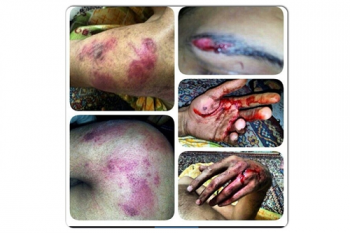
Bahrain: Abducted, Beaten and Threatened
3 February, 2014 – Bahrain Center for Human Rights
The Bahrain Center for Human Rights expresses concern about the continuation of grave violations including abduction of civilians, severe beatings and leaving them in a stranded area. These actions appear to come as a form of punishment and threat for those who participate in pro-democracy protests in the country. The BCHR has document numerous such cases in different areas that witness daily protests demanding the right to self-determination.
A civilian, who asked to remain unnamed for safety reasons, told the BCHR that he was abducted by security forces on the 17th of January 2014. He was reportedly severely beaten with different weapons and blunt objects. He added that he was verbally abused, and the security forces used very derogatory sectarian terms during the beating. The victim was then taken to Karraneh beach, where he thought he would be dumped, but the security forces continued to beat him until he lost consciousness after which they left. A number of Karraneh residents found him and moved him to a house where he was treated by a volunteer nurse as he feared anticipated arrest if he were to go to the hospital. …more
February 4, 2014 No Comments
Manufacturing Dissent
From Egypt, Ukraine, the Turkish-Syrian border, Cuba and Thailand
Manufacturing Opposition Movements
by Andre Vltchek – 3 February, 2014 – Dissent Voice
Government buildings are being trashed, ransacked. It is happening in Kiev and Bangkok, and in both cities, the governments appear to be toothless, too scared to intervene.
What is going on? Are popularly elected administrations all over the world becoming irrelevant; as the Western regime creates and then supports thuggish ‘opposition movements’ designed to destabilize any state that stands in the way of its desire to fully control the planet?
*****
They are shouting and intimidating those who want to vote for the moderately progressive government that is presently leading Thailand. There is no dispute over the electoral process – voting is generally free, as both international observers and most of the local Election Commission members agree.
Freedom, legitimacy or transparency is not what is at stake now.
The rhetoric varies, but in essence, the ‘protesters’ are demanding the dismemberment of the fragile Thai democracy. Most of them are paid by the upper-middle and upper classes. Some of them are thugs, many hired for around 500 Baht a day (roughly US$ 15) in the villages of the restive southern provinces of the country. They are accustomed to the use of violence, their body language and facial expressions clearly show it.
Government officials of the legitimate government have to climb over blockades, or beg protesters to allow them to enter their own offices.
People who came to vote in the pre-election round were intimidated and insulted, and one man was almost strangled to death.
While life in the capital has been fully disrupted, the government does not dare to send in tanks or the police to clear the streets. It should. But it is too scared of the army and the monarchy – two pillars of this outrageous hybrid of savage capitalism and feudalism – comparable only to even worse regional nightmares, such as Indonesia and the Philippines.
It is all in the open now: the government speaks of its fear, while the military sends poisonous threats through the lackey media and through ‘leaks’.
What is happening and what is at stake? The Prime Minister’s older brother, Thaksin Shinawatra, while he was PM himself, attempted to bring in a modern capitalist system to this submissive and deeply scared nation. And not only that: he housed the poor, introduced an excellent free universal medical care system (much more advanced than anything ever proposed in the United States), free and very advanced primary and secondary education, and other concepts deemed dangerous to the world order, and to the local feudal elites, as well as the army. …more
February 4, 2014 No Comments
Syria and Sorting Out A New Balance of Power in the Middle East
The war against Syria and the illusion of compromise
By Ghaleb Kandil – 2 February, 2014 – Voltaire.net
Some politicians believe that Russia and the United States agreed on compromises in the region, and that everything that happens politically and militarily in Syria is part of a scenario to implement these arrangements.
In fact, international relations are going through a transitional period that will see the outlines of a new balance of power. These new equilibrium were able to emerge through the resistance of the Syrian state against the colonial aggression led by the United States. It is clear that the US unilateral post-domination era is under construction. The rules of the new Cold War are not yet definitively drawn. Recognition by the United States at the end of its unilateral hegemony is accompanied by continued attempts to influence the new equations that are emerging.
It is in this context that fit US and Western pressures and interference in the backyard of Russia. Ukraine crisis is the best example of this attitude, as well as the continuation of the partnership between the United States and Saudi Arabia, to prolong the bloodshed in Syria, in the hope of changes for the benefit their agents of balance of power relations underlie all coming political compromise.
These are the realities emerging from the Geneva II Conference, where Americans have negotiated indirectly with the Syrian official delegation, through a delegation established by its ambassador in Damascus Robert Ford. It is in this same context that was taken the decision to exclude Iran from this conference, which was a message to Russia, worthy of the time of the unilateral hegemony through orders given to the Secretary General of the United Nations. The reform of this organization and the rebalancing of relations within it are also unavoidable conditions for establishing a multipolar world.
In this transitional period, the confrontation continues to develop new relations between international powers, and Syria is the mirror of the new international order. The belief in the existence of supposed international arrangements and a serious American will to fight against terrorism, is a pure illusion. Worse, it can distort the calculations and produce erroneous analyzes. …more
February 4, 2014 No Comments
Activist Surrenders after Saudi’s Terrorise his Family
Shia wanted over Saudi protests surrenders: Police
2 February, 2014 – ABNA
A Saudi man wanted in connection with peaceful protests in 2011 among the Shia Muslim minority in the conservative, Sunni-majority kingdom has handed himself in, police said on Sunday.
Musa Jaafar Mohammed al-Mabyuq surrendered to police in the mostly Shia district of Qatif, in Eastern Province, a police spokesman said in a statement carried by the official SPA news agency.
Mabyuq “will be dealt with according to legal procedures,” the unnamed spokesman said, praising “the constructive role of his family” in the surrender, without giving further details or saying when he had given himself up to the authorities.
The unrest in Eastern Province started after an outbreak of violence between Shia pilgrims and religious police in the Muslim holy city of Medina, in western Saudi Arabia, in February 2011.
The protests escalated when Riyadh led a force of Gulf troops into neighbouring Bahrain the following month to help crush Shia-led pro-democracy demonstrations in the tiny Sunni-ruled Gulf kingdom.
Eastern Province is home to most of the kingdom’s two million Shias, who represent 10 percent of the Saudi population. …more
February 4, 2014 No Comments
Bahrain Court of Injustice jails 13 activists defending against Police Violence
Bahrain high court jails 13 anti-regime activists
3 February, 2014 – Islamic Invitation Turkey
Bahrain’s high court has handed long jail terms of up to 15 years to 13 activists, as the Al Khalifa regime steps up its crackdown on demonstrators.
The court issued the verdicts on Monday after convicting the defendants of allegedly possessing Molotov Cocktails, burning tires and attending illegal gatherings in the Salihiya district of the capital, Manama.
The development comes less than a week after Bahrain’s Justice and Islamic Affairs Ministry filed a lawsuit against the Islamic Scholars Council, which is a Shia body, calling for the dissolution of the group and the confiscation of its assets.
The ministry claimed in the lawsuit that the Islamic Scholars Council has been engaged in political activities that “threatened the security of the Arab kingdom.”
Bahrain’s main opposition bloc, the al-Wefaq National Islamic Society, has censured the move, saying “the regime has declared war on Shias.”
A number of Bahraini scholars and clerics have also signed a petition to the UN Secretary-General Ban Ki-moon, in protest at the decision.
Since 2011, anti-regime demonstrations have been held almost every day in Bahrain.
On March 14, 2011, troops from Saudi Arabia and the United Arab Emirates were called in to assist the Bahraini regime in its crackdown on peaceful protesters. According to local sources, scores of people have been killed and hundreds arrested.
International human rights organizations have repeatedly slammed the Manama regime for the excessive use of force against peaceful protests. …more
February 4, 2014 No Comments
Zainab Al-Khawaja’s unending Sentence from Cruel Court of Injusice in Bahrain
Amnesty Int’l: Bahrain: Woman activist sentenced again in Bahrain: Zainab Al-Khawaja
31 January 2014 – Amnesty International
URGENT ACTION
Bahraini activist Zainab Al-Khawaja was sentenced to a further four months in prison by a Criminal Court in relation to two new cases brought against her for “destroying government property”.
On 27 January Zainab Al-Khawaja, dual Bahraini and Danish national, was sentenced by the Lower Criminal Court in Manama, the capital, to a further four months’ imprisonment on charge of “destroying government property”. After neither she nor her lawyer attended trial, Zainab Al-Khawaja was sentenced namely for ripping pictures of the King belonging to the Ministry of Interior, on 4 and 6 May 2012. The trial of another case against her is also due to begin on 5 February. She is charged with “insulting a police officer” because she verbally defended another prisoner who was insulted and humiliated by a prison guard on 22 June 2013 in ‘Issa Town detention centre for women, south of Manama, where both women are held.
Since 27 February 2013 Zainab Al-Khawaja has been serving several short prison sentences in five other cases and was due to be released on 20 February 2014. The sentences issued against her by lower criminal courts are final because she refused to appeal before higher courts believing that Bahrain’s judiciary is controlled by the government. She has also refused to pay bail for her release. Zainab Al-Khawaja has been boycotting court hearings and refusing to appear before the Public Prosecution. However, on 27 January she was informed of the court session half an hour before it was due to take place and she informed her lawyer shortly afterward but he was unable to attend. …more
February 4, 2014 No Comments
Nabeel Rajab chose to return, change Unjust System that keeps him in chains
Bahrain: Nabeel Rajab’s request for early release from prison denied by Bahraini authorities
28 January, 2014 – IFEX
The Gulf Centre for Human Rights (GCHR) and the Bahrain Center for Human Rights (BCHR) have expressed grave concern regarding the Bahraini authorities’ treatment of Nabeel Rajab, the imprisoned president of BCHR and the general secretary of GCHR, in addition to their refusal to grant him the early release he is eligible for as per the law.
A request for early release was submitted by Nabeel Rajab’s lawyers on 21 January 2014 to the court but it was rejected and no reasons were given to back the decision up.
Before announcing his verdict, the judge reportedly did not a take any action to investigate whether conditions for early release had been met. This is the third attempt submitted by Rajab’s lawyers requesting his release, based on article 349 of the Code of Criminal Procedures which sets conditions for early release.
These are as follows:
– Three quarters of the sentence had already been served;
– The defendant exhibits good and trustworthy behaviour whilst in detention;
– The defendant does not pose a threat to public security.
Although all three of those conditions apply to Rajab’s case, all requests submitted by his lawyers were rejected without reason.
In the letter submitted to the judge on 21 January, Nabeel Rajab’s lawyer provided evidence of his eligibility for early release and complained about the discrimination against Rajab in applying the law of early release, as well as the harm he suffered because of the prolonged delay in responding to his request which was submitted to the Court of Cassation to suspend the sentence. …more
February 4, 2014 No Comments
Vain Attempts at Crushing Religious Freedom Intensify Resistance in Bahrain
The regime in Bahrain is continuing its vicious attacks against the religious freedoms in Bahrian by continuously forbidding citizens from praying in the historic mosque of Al-Barbaghi.
Non-stop attacks against religious freedoms in Bahrain
2 February, 2014 – ABNA
The regime in Bahrain is continuing its vicious attacks against the religious freedoms in Bahrian by continuously forbidding citizens from praying in the historic mosque of Al-Barbaghi. The mosque was demolished by the regime forces during the revolutionary uprising in 2011 when 36 other mosques were vindictively destroyed as well.
The arbitrary ban was persistently imposed following the politicized decision to dissolve the clerics Islamic Council, vindictive sectarian measures taken against the Shia’as in Bahrain.
Three citizens were reported to have been arrested as they were attempting to reach the site of Al-Barbaghi mosques which was already besieged with barbed wires and police cars to prevent citizens from exercising their basic religious rights.
Al-Barbaghi mosque is a historic mosque that was built 440 years ago before the ruling family had arrived to Bahrain. The regime demolished it and destroyed the grave of Shaikh Mohammed Al-Barbagi and still refuses to reconstruct despite the fact that the BICI report and many human rights organizations recommended the reconstruction of the mosques destroyed by the regime during the uprising in 2011. …more
February 4, 2014 No Comments
Bahrain Regime intensifies Crackdown with intense assualt on Protests
February 4, 2014 No Comments
Bahrain Regime Dismantles Cleric’s Council in vain move to crush Dissent
Bahrain shuts Shiite clerics’ council
29 January, 2014 – Agence France Presse
DUBAI: A Bahraini court shuttered on Wednesday a Shiite Muslim clerics’ council, after authorities in the Sunni-ruled kingdom accused it of politicization and illegal operations.
The court ordered the closure of the Olamaa Islamic Council and the liquidation of its assets following a lawsuit by the ministry of justice, Islamic affairs and endowment, a judicial source said.
The ministry said in September that the office had been “functioning outside the law”.
The verdict came as authorities crack down on opposition action by Shiites, who make up the majority of the population in the Gulf archipelago.
The council led by prominent cleric Issa Qassem “violates the constitution and the laws of the kingdom,” the ministry said at the time, accusing its members of “using it to practise politics under a confessional cover”.
The council also “adopted the call for the so-called revolution,” it charged, referring to Shiite-led protests against the government that erupted in February 2011 before being dispersed a month later.
Home to the US Fifth Fleet and strategically situated across the Gulf from Iran, Bahrain still sees sporadic Shiite-led demonstrations, mostly outside the capital Manama.
At least 89 people have been killed in Bahrain since the protests began, according to the International Federation for Human Rights. …more
February 4, 2014 No Comments
Bahrain Police to walk with Impunity in murder Fadel Abbas – shot in head
Bahrain: Death of young detainee shot in head must be investigated
Fadel Abbas was shot by security forces as he tried to visit a recently released prisoner in the village of Markh.
“Bahrain’s authorities must come clean and open a full, independent investigation to establish the truth about the death of Fadel Abbas. Those responsible for his death must be held to account.”
Said Boumedouha, Deputy Director of Amnesty International’s Middle East and North Africa Programme.
The Bahraini authorities must immediately investigate the death in custody of a 19-year-old boy who was shot in the head by security forces, said Amnesty International.
“Bahrain’s authorities must come clean and open a full, independent investigation to establish the truth about the death of Fadel Abbas. Those responsible for his death must be held to account,” said Said Boumedouha, Deputy Director of Amnesty International’s Middle East and North Africa Programme.
“The conflicting information that has emerged over the version of events that led to his death makes such an investigation even more urgent.”
Fadel Abbas was wounded when security forces tried to arrest him and others as they went to visit a recently released prisoner in the village of Markh.
The Interior Ministry said in a statement on 26 January that Fadel Abbas had died of his wounds after he was shot on 8 January when he “purposefully” drove a car into members of the security forces as he attempted to escape arrest for smuggling arms and explosives. The Ministry said its forces had acted in self-defence.
Human rights activists, who published pictures of the body of Fadel Abbas, said that he sustained bullet injuries in the head and wounds to the leg during a violent altercation with the security forces.
Fadel Abbas’s family were also not told he had been arrested when they asked police about him after he went missing.
Fadel Abbas’s mother said that the Criminal Investigation Directorate had contacted her on 26 January to inform her of her son’s death. Prior to this the family said they were not given any information about his whereabouts or medical condition and were not allowed to visit him in hospital. The Interior Ministry has stated that Fadel Abbas’s family were allowed access to him on 13 January.
The killing of Fadel Abbas has triggered protests in the village of Diraz, west of the capital Manama where his funeral was held. Police fired tear gas and gunshots as they clashed with protesters after the funeral.
…more
February 4, 2014 No Comments
Bahrain Regime Froces Murder Fadel Abbas Musalem, 20 years old
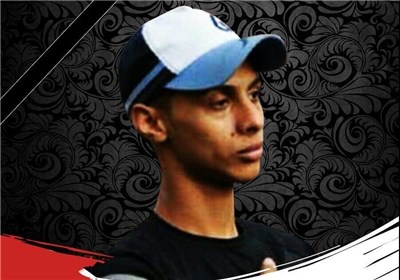
Young Bahraini Dies of Wounds
27 January, 2014 – Tasnim
TEHRAN (Tasnim) – A young Bahraini prisoner died of wounds he suffered during a police operation to detain him as the main political opposition group said the man died as a result of torture during his detention.
printPrint
A ministry statement said Sunday that Fadel Abbas Musalem, 20, had been taken to hospital after being “wounded in the head” on January 8 when police tried to arrest him in a village near the capital Manama.
It added that police acted in “legitimate defence” when they fired on a car carrying Musalem and another man when it kept driving towards security forces despite warning shots.
The other man was also arrested.
Musallem was part of a group suspected of “involvement in smuggling weapons and explosives and in terrorist acts”, the ministry added.
But the main Shiite opposition group Al-Wefaq said Musallem had been tortured “savagely”, AFP reported.
It said in a statement that besides a wound to his head, his body had signs of “bruises on his back, around the neck and on his face”.
His lip had also been cut and he had a “deep wound to the right shoulder”, Al-Wefaq said.
Thousands of people attended his funeral on Sunday in Daraz, a Shiite village near Manama, chanting anti-government slogans, witnesses said.
Security forces later intervened when “saboteurs threw Molotov cocktails at them and closed a main road”, the interior ministry said on Twitter.
Since mid-February 2011, thousands of pro-democracy protesters have staged numerous demonstrations in the streets of Bahrain, calling for the Al Khalifa royal family to relinquish power.
The demonstrations were dispersed in mid-March in a deadly crackdown helped by security forces from neighbouring Saudi Arabia.
Demonstrators frequently clash with security forces in villages outside the capital.
…more
February 4, 2014 No Comments
US Frustrates Democracy in Bahrain to Preserve its Military Foot-hold
February 4, 2014 No Comments
The Legend of Bahrain
February 4, 2014 No Comments

